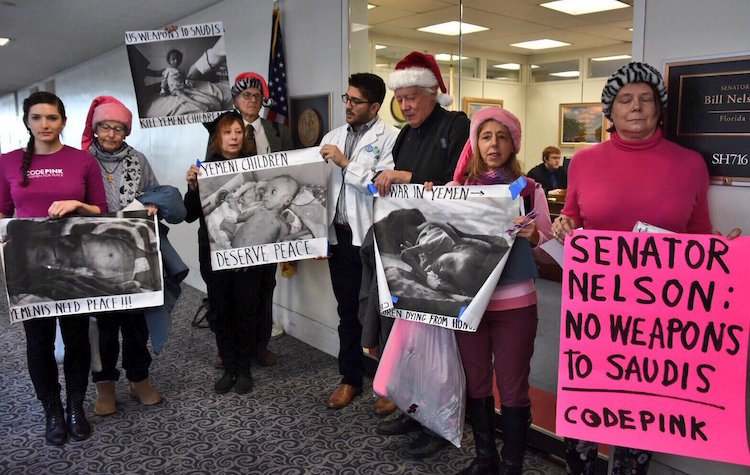By Caroline Mwanga
NEW YORK (IDN) – Because money pledged by Member States has “failed to materialize”, the United Nations is being forced to cease several relief operations in Yemen, which is embroiled in the worst humanitarian crisis triggered by a long-drawn conflict.
“All of us are ashamed by the situation,” Lise Grande, UN Humanitarian Coordinator for Yemen, said on August 21. “It’s heart-breaking to look a family in the eye and say we have no money to help.” She added: “We are desperate for the funds that were promised. When money doesn’t come, people die.”
 At a pledging conference for Yemen held in February 2019, the UN and humanitarian partners were promised $2.6 billion to meet the urgent needs of more than 20 million Yemenis. To date, less than half of this amount has been received.
At a pledging conference for Yemen held in February 2019, the UN and humanitarian partners were promised $2.6 billion to meet the urgent needs of more than 20 million Yemenis. To date, less than half of this amount has been received.
Millions of people in Yemen depend on the UN to survive. Through no fault of their own they are the victims of the Iran-Saudi Arabia proxy conflict. Saudi Arabia is keen to combat Iranian influence in the region.
According to the UN and other sources, from March 2015 to December 2017, between 8,670–13,600 people were killed in Yemen, including more than 5,200 civilians, as well as estimates of more than 50,000 dead as a result of an ongoing famine due to the conflict.
In 2018, the United Nations warned that 13 million Yemeni civilians face starvation in what it says could become “the worst famine in the world in 100 years”.
“This is the largest humanitarian operation in the world addressing the worst humanitarian crisis,” the UN Humanitarian Coordinator for Yemen said. “When we receive funding, we make a huge difference.”
“The impact when we do so is immediate,” she underscored. “In half of the districts where people were facing famine, conditions have improved to the point where families are no longer at risk of starvation.”
Grande thanked the donors who have lived up to their promises, saying that with their money “we’ve been able to double, and in some areas, triple the amount of assistance we’re providing”.
Unless the funds promised at the pledging conference are received in the coming weeks, food rations for 12 million people will be reduced and at least 2.5 million malnourished children will be cut-off from essential services.
Besides, 19 million people will lose access to health care, including one million women who depend on the UN for reproductive health. Clean water programmes for five million people will be shuttered at the end of October and tens of thousands of displaced families may find themselves homeless.
“All of us are ashamed by the situation,” “It’s heart-breaking to look a family in the eye and say we have no money to help.” She added: “We are desperate for the funds that were promised. When money doesn’t come, people die.”
 Photo: This baby boy weighed 2.5 kg when he was born in Yemen. Now at four months old he suffers from severe acute malnutrition. (file). Credit: OCHA/Giles Clarke.
Photo: This baby boy weighed 2.5 kg when he was born in Yemen. Now at four months old he suffers from severe acute malnutrition. (file). Credit: OCHA/Giles Clarke.
Of the 34 major UN humanitarian programmes in Yemen, only three are funded for the entire year. Several have closed in recent weeks, and many large-scale projects designed to help destitute, hungry families have been unable to start. Another 22 lifesaving programmes will close in the next two months unless funding is received.
The UN Office for the Coordination of Humanitarian Affairs (OCHA) said the UN had been forced to suspend most of the country’s vaccination campaigns in May. Procurement of medicines has been stopped and thousands of health workers are no longer receiving financial support.
Plans to construct 30 new nutrition centres have been shelved and 14 safe houses and four specialized mental health facilities for women have closed. A treatment plant that purifies the water used to irrigate agricultural fields shut in June.
The international community has sharply condemned the Saudi Arabian-led bombing campaign, which has included widespread bombing of civilian areas. The bombing campaign has killed or injured an estimated 17,729 civilians as of March 2019 according to the Yemen Data Project. Despite this, the crisis has only recently begun to gain as much international media as the Syrian civil war.
The U.S. has been providing bombs to aid the Saudi forces and airstrikes in Yemen. In March 2019, this has led the U.S. Senate to pass a resolution to end U.S. support of Saudi Arabia. It has since been vetoed by President Donald Trump, and in May, the Senate failed to override the veto. [IDN-InDepthNews – 21 August 2019]
Photo (top): Code Pink anti-war activists protest U.S. Senators supporting Saudi-U.S. arms deals, December 2017. Source: Wikimedia Commons. CC BY 2.0
Photo (in text): This baby boy weighed 2.5 kg when he was born in Yemen. Now at four months old he suffers from severe acute malnutrition. (file). Credit: OCHA/Giles Clarke.
IDN is flagship agency of the International Press Syndicate.
facebook.com/IDN.GoingDeeper – twitter.com/InDepthNews

